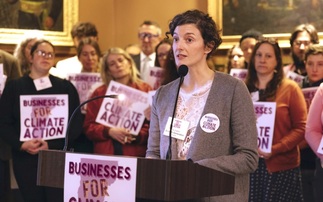Christiana Figueres and Richard Kinley urge countries to put forward 'bridging' texts, as negotiators fear talks are grinding to a halt
The two most senior officials in the United Nations Climate Change Secretariat have called on countries at the latest round of talks in Bonn to put forward draft texts for a global deal, as fears grow that the negotiations are once again stalling.
Christiana Figueres, executive secretary of the UN's Framework Convention on Climate Change (UNFCC), and her deputy, Richard Kinley, both admitted yesterday they understood the frustration felt by all parties this week at the slow pace of talks, but urged negotiators to keep moving and deliver some fresh proposals.
"There's always a level of frustration because we all want to have a magic wand," she told BusinessGreen on the sidelines of the talks. "This is a very difficult process about a very, very challenging subject and work has to be done."
At the latest round of talks in Bonn, countries yesterday raised the alarm that time is running out before the Paris Summit at the end of this year where they will be expected to sign a global deal to tackle climate change.
At a sombre stocktaking session midway through this week's talks, countries gathered to express concerns that the negotiations have barely started this week, calling on the co-chairs Ahmed Djoghlaf and Daniel Reifsnyder to inject some momentum into the last two days of this round of negotiations.
From Nigeria to Saudi Arabia and the European Union, parties warned that as of today, there is now just seven negotiating days left before the start of the Paris Conference of the Parties (COP 21) in December. The current draft negotiating text remains over 80 pages in length, with all attempts to streamline it having so far stalled.
During this week's talks, groups were expected to put forward their "bridging proposals" for the latest negotiating text but just a handful of parties have done so. These bridging proposals would reveal countries' positions on the streamlined text that the co-chairs published since the previous round of talks, kick-starting a fresh wave of negotiations ahead of Paris.
The co-chairs' tool, as it is known, whittled down the original text to 83 pages, by restructuring paragraphs into key themes and providing bracketed options for each clause. They now want countries to use the "tool" as a structure to decide how they want the final text to look, further shortening the document.
"It's a helpful instrument for parties to have a little bit of organisation in their thinking but it remains a co-chair instrument," said Figueres, adding that the final text should include more input from the countries themselves.
However, the bulk of countries have so far been reluctant to publicly stake out their positions and while progress has been made, with countries covering nearly 70 per cent of global greenhouse gas emissions submitting national climate action plans, deep divisions remain over climate funding commitments and how any new treaty would be enforced and updated.
Kinley defended the lack of progress this week, arguing countries were starting to make headway on their bridging proposals.
"The frustration that everyone who wants to see success in Paris is a shared frustration because we all want to get to that point as quickly as possible," he told BusinessGreen. "The groups are starting to come to grips with what is a very complicated set of different positions and the feedback we're getting is that things are starting to move but the proof will be in what happens in the groups [today] after the stocktaking, and the discussions the co-chairs will have about the next steps."
At the stocktaking last night, some poorer countries asked how they could justify sending delegates to the next round of talks in October if this week failed to deliver meaningful progress.
Peter Betts, a UK government official speaking on behalf of the EU delegation, said it was no time for complacency, adding the bloc had been "disappointed" by the "tool" that the co-chairs put forward in July.
"The tool was clearly not in any form or shape that was capable of being negotiated," he told the conference. "Having said that, when we looked at it we did see that it had some benefits. We appreciated the fact that it really bought out a bit more of a structure and really drew attention to the fact that the agreement itself is going to be short and concise."
He added that in some of the working groups, countries were starting to converge on certain ideas and talk about how that could be captured in a deal, but said overall there was still a huge amount of work to be done to deliver an agreement.
With just two days of talks left this week, it remains to be seen how many more parties will unveil their bridging proposals, spurring action towards the October session.
This article is part of BusinessGreen's Road to Paris hub, hosted in association with PwC








